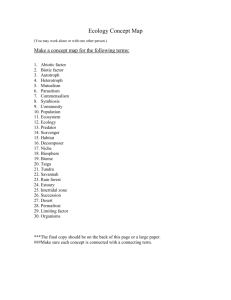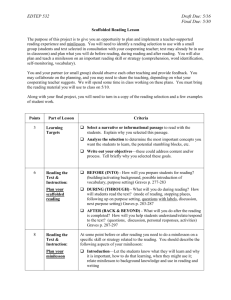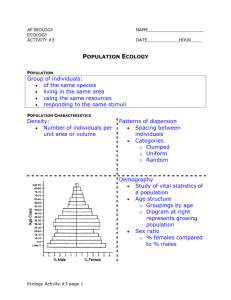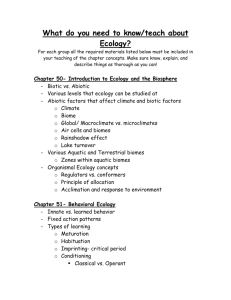Human Impact Review - Bronx Envision Academy
advertisement
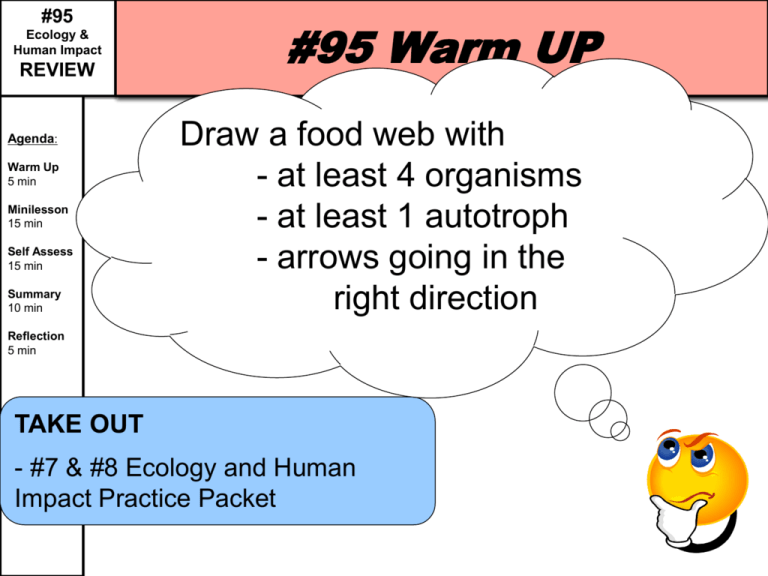
#95 Ecology & Human Impact REVIEW Agenda: Warm Up 5 min Minilesson 15 min Self Assess 15 min Summary 10 min #95 Warm UP Draw a food web with - at least 4 organisms - at least 1 autotroph - arrows going in the right direction Reflection 5 min TAKE OUT - #7 & #8 Ecology and Human Impact Practice Packet #95 Ecology & Human Impact REVIEW Agenda: Warm Up 5 min Minilesson 15 min Self Assess 15 min Summary 10 min Reflection 5 min Big Concepts in Ecology • Energy moves in one direction, constantly being added by the sun, it is NOT recycled • Materials (water, nutrients, carbon) cycle through an ecosystem • Abiotic factors are nonliving (water, light) • Biotic factors are living (predators) • Biotic and Abiotic factors keep populations from growing too big; all ecosystems have a carrying capacity • When organisms interact it can be positive or negative #95 Ecology & Human Impact REVIEW Agenda: Warm Up 5 min Minilesson 15 min Self Assess 15 min Summary 10 min Reflection 5 min Big Concepts in Ecology • All stable ecosystems need more autotrophs than heterotrophs AND they need decomposers to recycle nutrients back to soil • All stable ecosystems have high biodiversity • Each organism has its own niche, to avoid competition • Ecosystems that change suddenly usually return to their original state by succession, leading to a more stable community #95 Ecology & Human Impact REVIEW Agenda: Warm Up 5 min Minilesson 15 min Self Assess 15 min Summary 10 min Reflection 5 min Key Terms • Heterotroph: eats its food • Autotroph: makes its own food • Decomposer: breaks down dead materials • Herbivore: eats only plants • Carnivore: eats only animals • Omnivore: eats both plants and animals #95 Ecology & Human Impact REVIEW Agenda: Warm Up 5 min Minilesson 15 min Self Assess 15 min Summary 10 min Reflection 5 min Practice #95 Ecology & Human Impact REVIEW Agenda: Warm Up 5 min Minilesson 15 min Self Assess 15 min Summary 10 min Reflection 5 min Practice #95 Ecology & Human Impact REVIEW Agenda: Warm Up 5 min Minilesson 15 min Self Assess 15 min Summary 10 min Reflection 5 min Big Concepts in Human Impact • Most ecological problems are because of human overpopulation (due to better medicine, sanitation, and technology) #95 Ecology & Human Impact REVIEW Pollution How/Why does it happen? Burning fossil fuels – Agenda: Warm Up 5 min Minilesson 15 min Using aerosols – Self Assess 15 min Summary 10 min Reflection 5 min Habitat Destructio n Invasive Species Run-off of chemicals/fertilizers from land - Why is it bad? Solutions? #95 Ecology & Human Impact REVIEW Agenda: Warm Up 5 min Minilesson 15 min Self Assess 15 min Summary 10 min Reflection 5 min Activity – Self Assessment Score and correct your #7 & #8 REVIEW packet using the answer keys provided As a table, Identify 2 questions from the packet: 1 question you thought was extremely difficult, that you STILL do not understand 1 question where you can explain the mistake you made and how to get the correct answer Share on your easel (do not write out the question) Extension WORK ON VOCAB Study Island – Any Unit that you want to review #95 Ecology & Human Impact REVIEW Agenda: Warm Up 5 min Minilesson 15 min Self Assess 15 min Summary 10 min Reflection 5 min Summary • Let’s review any questions you have from the HW #95 Ecology & Human Impact REVIEW Agenda: Warm Up 5 min REFLECTION How does the removal or extinction of one species affect others in the ecosystem? Minilesson 15 min Self Assess 15 min Summary 10 min Reflection 5 min HOMEWORK Regents Practice for LABS
